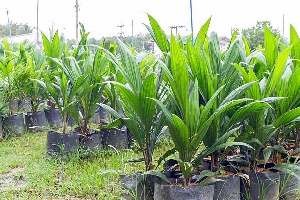The Savannah Agricultural Research Institute of the Council for Scientific and Industrial Research (CSIR-SARI) has introduced farmers to stress-resilient crop varieties, to help them adapt to the challenges of climate change, enhance productivity, and food security.
The farmers were introduced to the improved crop varieties during a demonstration field visit in the Wa municipality.
The farmers drawn from the Kpongu community in the Wa municipality were introduced to the improved crops, which included: stress-tolerant maize varieties; sorghum hybrids; onions; millet and groundnut varieties.
Addressing the farmers on the field, Dr George Mahama, an Agronomist at the Wa office of CSIR-SARI, explained that the crop varieties were not just stress tolerant, but also high yielding and extra-early to intermediate maturing.
He said adopting those crop varieties could improve farmers’ productivity amidst the climate change impact experienced in recent times.
“These stress-resilient crop varieties will give farmers a beacon of hope in their farming endeavours during this period where climate change seems to have come to stay”, Dr. Mahama indicated.
He encouraged farmers to adopt improved crop varieties to help enhance their farming activities and their economic fortunes.
Mr Asieku Yahaya, a Research Scientist at the Wa office of the CSIR-SARI, introduced the farmers to four early pearl millet cultivars that were intercropped with an early cowpea variety, which was a climate change adaptation strategy.
He encouraged farmers to patronise those varieties as they were a potent solution to climate change effects experienced especially in this year’s cropping season.
He said those varieties released by the CSIR-SARI were early maturing and reaching “physiological maturity between 70-80 days and yield potential of 1.9 to 2.1 tons per hectare”.
Mr Hashim Ibrahim, an Assistant Research Scientist of the CSIR-SARI, Wa station, took the participants through resilient and sustainable onion production.
He said some farmers in the region perceived that onions could not yield well in that region.
“For this reason, Idol and Texas tropical varieties of onion are tried on our research field for farmers to familiarise with good agricultural practices,” he stated.
Some farmers who participated in the trial field visit shared their concerns about the drought, which affected their farm output.
Madam Hawa Dauda, a farmer said, “I farmed an acre of groundnuts this year, but due to the drought, I harvested just a bag of groundnuts”.
The farmers, therefore, expressed hope that the new stress and drought-resilient crop varieties would help reduce the impact of climate change on their farming activities.
Mr Fredrick Vuozie, the Wa Municipal Director of Agriculture, noted that the prolonged drought experienced this year affected farmers, resulting in significant crop losses and reduced yields.
He said over 8,000 hectares of crops had been destroyed by drought within the Municipality alone.
Mr Vuozie commended CSIR-SARI for the initiative stating that the stress-resilient varieties would help mitigate the impact of drought on the farmers in subsequent years.
Watch the latest edition of BizHeadlines below:
Ghana’s leading digital news platform, GhanaWeb, in conjunction with the Korle-Bu Teaching Hospital, is embarking on an aggressive campaign which is geared towards ensuring that parliament passes comprehensive legislation to guide organ harvesting, organ donation, and organ transplantation in the country.
Click here to follow the GhanaWeb Business WhatsApp channel
Business News of Thursday, 26 September 2024
Source: GNA
CSIR-SARI introduces stress-resilient crop varieties to farmers in Wa
Entertainment












